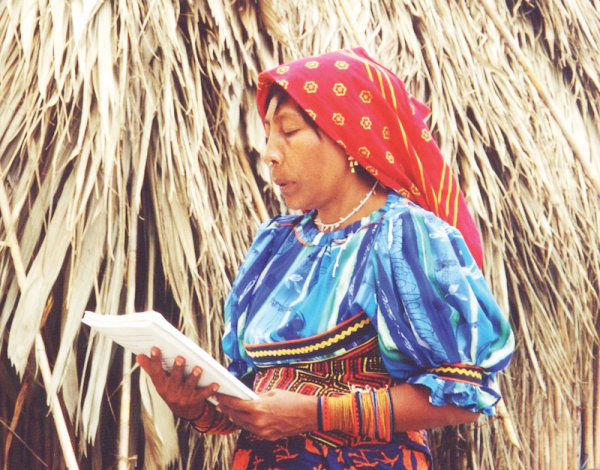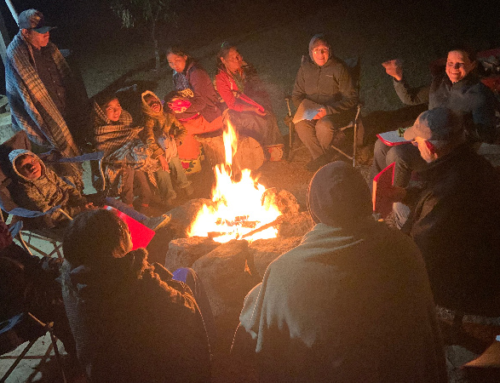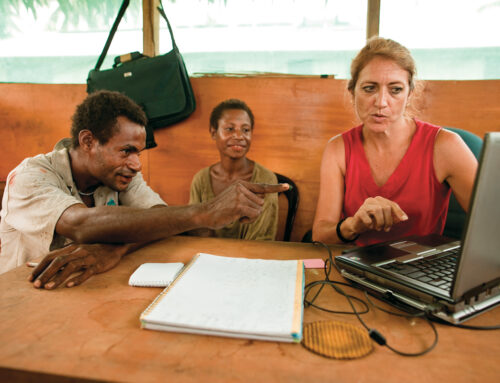So many of us take for granted the ability to read, write and do simple math problems. Yet there are hundreds of languages that so far have no alphabet and therefore no written form of communication.
The blessings of having an alphabet and a written language are being felt by many as Ethnos missionaries tackle the task of analyzing and producing a written form of those languages. Many of you have given sacrificially in order to see these language mysteries solved — and written down. Thank you!
Let us share with you a few quotes from people who have recognized the importance of reading.
“Thank you for teaching me to read. Otherwise that Book (pointing to the Bible) would just be a book sitting on my table. But because I can read, it’s God’s Word speaking to me.”

The Moi people in the Asia-Pacific region have a thriving church now, thanks to the years spent by the team to learn their language, develop a literacy program, translate God’s Word and teach them the truths of God.
“I think it’s good to know how to read God’s Word so that we can know the Creator’s talk and get His truth straight from His Word. If we just rely on our own thoughts, it will be crooked. If we take it from the Creator’s talk, it won’t be crooked. It will just be true. Because the Creator made His talk to be truth, we can get truth from His leaf (book).” —Iyodotabo“I’m thinking that if I don’t learn to read, I will just rely on people’s made up words instead of what the Creator says.” —Weiwa“Reading is good because I can read the Creator’s talk and then tell it to others. But I can only teach others in the Creator’s strength. People that don’t think ‘It’s true’ about Jesus also think that reading is a small thing. But we who think ‘It’s true’ about Jesus know that reading is a big thing.”—Minawagii
One thing that is intriguing is the way that people will respond to the whole idea of learning how to read in their own language. Some are impressed, some curious, some disinterested.

Katie Moore ministers with the Nahuatl people in Mexico, working with the literacy program. One of her students is Andrea, a believer. Before class, this was her prayer:
“Our Dad God,
I wanted to tell you something — well, ask for You to help us. You should help us students, the little ones as well as the big ones. Give us luck; give us strength to do well in school. Don’t allow us to be lazy but cause us to pay attention and to be smart. Cause our teacher to be wise and cause us to learn well so that we can read. That is all I wanted to say. That only.” (After a frantic whisper from her two kids:“Oh, I guess I forgot to say ‘Amen.’”)
“I can read now. I am no longer like a cow. A cow just walks around and eats, and that is all I used to do. Now I can read; I can learn things.”
Now that’s a concrete mental picture, isn’t it?
How then do we encourage the new readers to continue? How do we press on to let them gain the knowledge of putting letters together to make words, to make sentences, to tell stories? Going back to Katie’s class, she tells what she did:
“I wanted to encourage the ladies in my literacy class about the progress that they’ve made. We are still in the beginning days, but each new syllable opens a world of new words in their own language. I found a New Testament passage with a large collection of words they already have learned (little boy, was born, was called, man, with and so on) — [in other words], the birth of Christ. I underlined every word in the section that they know — a pretty impressive collection for such a small section.“Then I told them, ‘You guys are just barely starting, and look at all the words you know from God’s Bible.’ Then I read it to them, slowing down significantly and having them watch as I sounded out the words they know. They joined with me, sounding out ‘ta-ka-ti-to’ (little boy) and ‘i-to-ka’ (was called) in the right spots.“‘And we will just keep learning,’ I told them, ‘slowly, slowly, until you know all the words in this book and can learn about Jesus.’”
“It’s so that they can know the Creator God,” Jerry said. “God chose to write the most important message down. Creator God, who could have chosen any method in all the world to preserve His Word, chose a written method. That just kind of implies that you need to have readers. It’s pretty practical when you just step back and think about it.”
To take part, make a secure online gift below.
[barefoot_donate_button campaign_code=”Project” appeal_code=”Website” project_code=”PCA038″ product=”Bible Translation” title=”BIBLE TRANSLATION” description=”
Would you consider partnering with us to translate the Word of God into languages which don’t currently have a bible translation?
-
- $35 provides for a verse.
- $500 would pay to translate a book the size of 3 John
- $1k would translate an average chapter
- $5k tranlsates a book the size of Galatians
” button_text=”DONATE TO BIBLE TRANSLATION”]






